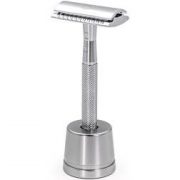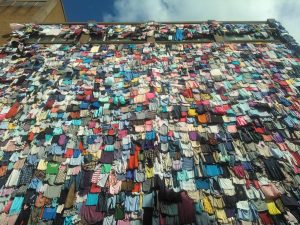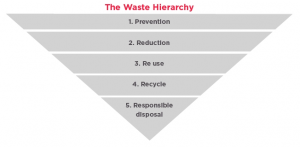
September 6, 2021, by sustainablenottingham
Welcome to Zero Waste Week
Hello and welcome to Zero Waste Week. My name is Louis and I work for the University’s waste management company, Enva. My role is to offer customer engagement with the aim of increasing knowledge when it comes to sustainability and waste management.
This is the first of two blogs focusing on the waste hierarchy. Here we look at how ‘Reduction’ and ‘Reuse’ can help lower the amount of waste you produce.
What is zero waste week?
Zero Waste Week takes place 6 – 10 September. The premise of the week is to make people aware of the incremental changes they can make in their daily lives to limit the amount of waste they contribute to landfill. Below are some tricks that could help you waste less.
Which trick suits you?
Sustainability, it’s a hairy subject

Safety razors are a sustainable option
Safety razors are fantastic and most of all they are far cheaper than buying disposable razors. The safety razor comes with the benefits of a closer shave and less razor burn. If that hasn’t sold you, this might. Most safety razors are made from stainless steel meaning that if they do break, they’re 100% recyclable… But they don’t often break.
Rechargeable electric razors are a more ecofriendly option than the disposable razors because, depending on the quality of the razor, they can last for years. This style of razor also offers other benefits in that no shaving cream or water is needed. This is great for sustainability as it removes both an opportunity for waste in the shaving cream and unnecessary water waste. While unfortunately some of the electric razors still need to be plugged in, thankfully most use rechargeable batteries and some even solar power!
Sanitary sustainability
Unfortunately, one of the UK’s leading sustainability issues is Sewage Related Debris, commonly known as SRD. Essentially that’s anything that we flush down our toilets. Included in that are sanitary pads, feminine wipes, applicators and tampons. According to sustainability pioneer Mooncup, women will use around 11,000 sanitary products in their lifetime, and everyday 27,900 used tampons, towels and applicators wash onto the world beaches. Other elements to consider are the products plastic backing strips, the wrappers and the top sheets, none of these items are biodegradable. But it’s not all doom and gloom there are options…
Option number one is the Mooncup! Since they began in 2002, Mooncup have ensured that 2.4 billion less tampons have washed on the beaches worldwide. The Mooncup product is made of medical grade silicone and because of its reusability, it offers an end to the waste from buying tampons and pads. Mooncup boast that their product can last for years and say users will breakeven on that purchase in six to eight months if they’re usual tampon purchasers.
Option number two is Here We Flo (HWF) pads and tampons. HWF offer products made of oeko-tex bamboo, organic cotton and plant friendly materials. These materials are all 100% compostable, biodegradable and recyclable. The liners and applicators are 100% plastic free. They’re 100% compostable, from tampon to liner to wrapper. On top of all that good stuff, the outer packaging is made of FCS-certified recyclable cardboard and they’re vegan and cruelty free. The product itself doesn’t sound so bad either, 100% organic, PH-respecting & never over drying.
Feel good fashion

How can we slow down fast fashion?
Finally, the big one, we’re all guilty of buying some new clothes for a night out or an event. We live in a world where there are always new clothes to buy, and nobody can deny that new clothes make a person feel good. Unfortunately, the Intergovernmental panel on climate control (IPCC) report that fast fashion is responsible for 10% of global carbon emissions every year. Fast fashion also needs tremendous resources to be produced. It’s estimated that the industry uses 1.5 trillion litres of water annually.
Another issue is the distance materials travel to make a fast fashion product. Recently popularized by websites like Depop and Vinted, thrift shopping has never been more popular in the U.K. Buying clothes from quality material, that will stand the test of time, greatly reduces the need to purchase more. Plus you can find great quality brands at a cut price when shopping second hand. Due to the fast-moving nature of fashion, much of it has hardly been worn! Finally, becoming a thrift shopper can also serve to make you some money! Selling your old clothes that don’t get much wear anymore can free up some space in your wardrobe and fill up some space in your wallet.
Look out for our second blog in this series out during Recycle Week (20-26 September) with a focus on… recycling!
No comments yet, fill out a comment to be the first


Leave a Reply